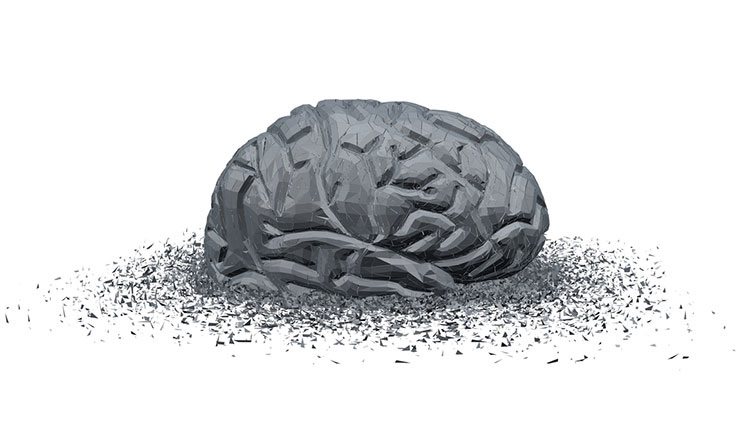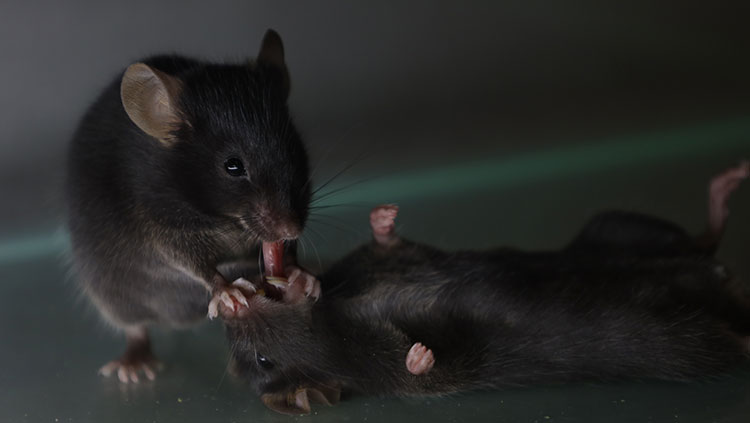ICYMI: Glutamate Buildup in Prefrontal Cortex May Indicate Mental Fatigue
- Published7 Sep 2022
- Author Tristan Rivera
- Source BrainFacts/SfN

Many jobs require sustained concentration, memory recall, and accurate decision making. But too many weeks demanding this sustained mental energy over long periods may lead to fatigue or burnout. A study published on August 11 in Current Biology hints at a neurobiological marker reflecting this kind of mental fatigue.
Researchers from Sorbonne Universités in Paris divided 39 study participants into two groups. Both groups were assigned challenging cognitive tasks that induced mental fatigue over 6 hours. Tasks ranged from deciding whether letters and numbers quickly flashing on a computer were one thing or another (green or red, uppercase or lowercase, etc.) to recalling whether a number on the screen matched one viewed from three characters prior. In the first group, people completed more complex versions of the same tasks. Researchers gauged cognitive fatigue through moments of impulsive decision making — asking participants to make choices requiring self-control, like receiving cash immediately or earning a larger amount later.
Magnetic resonance spectroscopy, a noninvasive technique using radio waves and magnets, was used to detect participants’ levels of glutamate as the experiments progressed. The excitatory neurotransmitter is implicated in learning, memory, and development as well as cell damage and death when its overconcentration leads to overstimulation. Researchers wanted to see if glutamate levels were related to behavior commonly associated with mental exhaustion.
The researchers found that the group assigned to the more complex tasks made around 10 percent more impulsive choices than those with easier tasks. The team also found those in the more demanding task group had eight percent higher concentrations of glutamate in the lateral prefrontal cortex than those who had performed the more manageable tasks.
Big Picture:
Excess glutamate levels may serve as an indicator for measuring biological fatigue. This finding could provide insights into conditions for those with more chronic exhaustion — and give clues into some of the mechanics underlying burnout. But the buildup may not reflect only mental exhaustion.
In a previous study, researchers found the buildup of fatigue markers in the lateral prefrontal cortex during physically demanding tasks. It’s still unclear if this buildup is an issue, and we don't exactly how our system naturally restores this balance — but sleep may play an important role. With skepticism from outside experts and a backlog of questions spurred by the findings, more research and input could clarify what tires our wits.
Read more: Mentally exhausted? Study blames buildup of key chemical in brain. Science
More Top Stories
- Artificial neuron connected to rat cells in a dish receives and releases dopamine like a real neuron. New Scientist
- Blood tests on the day of a traumatic brain injury predicts likelihood of death of survival with severe disability. STAT
- Each mosquito olfactory neuron has multiple receptors that can detect multiple odors. NPR
- COVID linked to increased risk of brain disorders compared with those with other respiratory infections. Axios
- 20 minutes of weak electrical currents into the brain reversed aging associated memory declines. STAT
- We’re less likely to help others when we are sleep deprived. Science News
- Pre-emptively showing people videos and tactics behind misinformation made them more skeptical of later falsehoods. New York Times
- Location of mouse eyes during REM sleep is related to head movements in their dreams — but some aren’t convinced. The Atlantic
- Macaques attempt to solve an unsolvable puzzle using initial strategy acquired from a learning task — even after inconsistent reward structures ensued. The Scientist
- Jumping spiders seem to be exhibiting a REM-like sleep state. New Scientist
CONTENT PROVIDED BY
BrainFacts/SfN
References
Müller, T., Klein-Flügge, M.C., Manohar, S.G. et al. 2021. Neural and computational mechanisms of momentary fatigue and persistence in effort-based choice. Nat Commun 12, 4593 https://doi.org/10.1038/s41467-021-24927-7
Wiehler, A., Branzoli, F., Adanyeguh, I., Mochel, F., & Pessiglione, M. 2022. A neuro-metabolic account of why daylong cognitive work alters the control of economic decisions. Current biology: CB, 32(16), 3564–3575.e5. https://doi.org/10.1016/j.cub.2022.07.010
What to Read Next
Also In Neuroscience in the News
Trending
Popular articles on BrainFacts.org



















